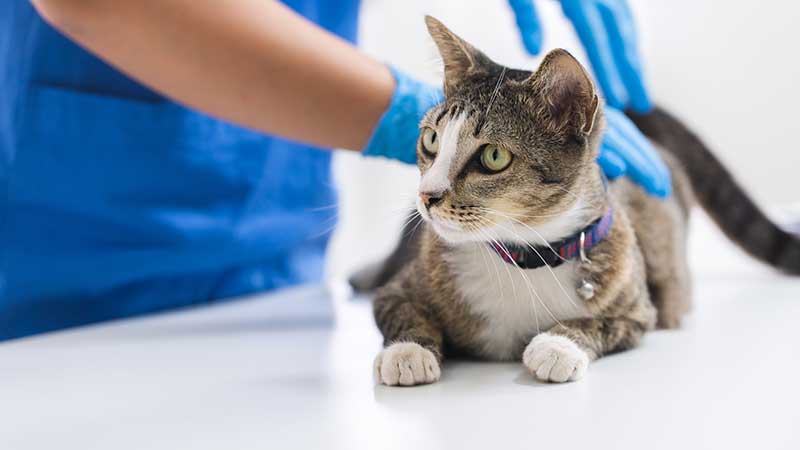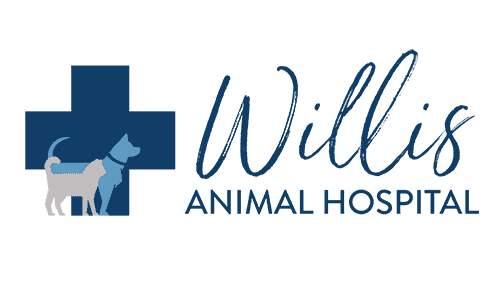Supporting Pet Wellness Through Preventive Care
Willis Animal Hospital understands that pet owners want the best for their pets. Defining characteristics of ownership goals may include excellent nutrition, daily exercise, environmental enrichment, and, of course, love!
To keep your pet’s health within the safest possible parameters, the prevention of disease is a huge priority. We take the following factors into consideration for every unique pet’s routine wellness exam:
- Species
- Breed
- Age
- Lifestyle
- Medical history

Staying proactive about your pet’s overall wellness is essential to supporting a long, full life. We are dedicated to helping you meet all of your pet’s changing needs as they move through every stage of life.
Nose-to-Tail Exams
At every routine wellness exam, we take time to assess a pet’s physical condition and consider the following aspects of appearance and behavior:
- Weight
- Alertness
- Musculoskeletal characteristics
- Eyes, nose, ears, teeth, and gums
- Skin and coat
- Abdominal structure
- Lymph nodes
- Heart and respiratory rates
Our findings usually lead to a discussion about a pet’s personality, habits, diet, and lifestyle. We encourage pet owners to bring a list of any questions or concerns.
The Entire Picture
Preventive care often consists of:

Baselines and Early Detection
Pets hide symptoms of illness or injury as an instinct for survival. Routine exams serve two purposes: preventing health problems, and the ability to detect health conditions before they become untreatable.
When we see and evaluate a pet at their healthiest, these baseline values create awareness if/when future results differ. Previously recorded baseline values can trigger additional evaluations or diagnostics to get to the bottom of any differences.
Puppies and Kittens
Young animals need a lot of TLC to establish a healthy start. Because their immune systems are in development, puppies and kittens are susceptible to many infectious diseases. If applicable, deworming and the age-appropriate vaccinations will be part of your new pet’s first wellness exam. Vaccinations are completed in regular intervals that require monthly visits until your kitten or puppy is about 4 months old.
Spaying and Neutering
Spaying or neutering is an important facet of responsible pet ownership. This surgery not only decreases overpopulation, but reduces cancer and infection in the reproductive organs. Surgical sterilization also minimizes problematic behaviors like marking, mounting, aggression, wandering, and more.
Microchipping
Microchipping is often completed during a pet’s spay or neuter surgery, but can also be done during an exam. Using a needle similar as in a vaccination, microchips are implanted just below the skin. Not a replacement for ID tags and collar, microchips add an extra layer of defense against a permanently lost or missing pet.
Adult Pets
We typically examine pets between 1–7 years old once a year. We can address the following health needs of adult pets:
- Diet and weight
- Dental care
- Behavior and training
- Parasite prevention medication (fleas, ticks, heartworm-carrying mosquitoes, ear mites, hookworm, roundworm, etc.)
- Vaccinations
- Exercise
- Lifestyle support and environment enrichment
Senior Pets
To keep an aging pet happy, safe, and comfortable, there are some important measures that boost senior pet care. Pets over the age of seven years old benefit from two visits a year. Frequent evaluation of their appearance and behavior can help us develop a plan that treats and supports age-related illness or injury.
Common health conditions in senior pets include:
- Osteoarthritis
- Kidney disease
- Diabetes
- Urinary tract disease
- Cancer
- Dental disease
- Blindness or deafness
- Liver disease
- Heart disease
Diagnostics and imaging can help us pinpoint exactly what’s going on. The more information we have, the better chance for effective treatment, high quality of life, and longevity.
Collaborative Care
Every life stage brings its own set of health considerations, and we are here to help you understand exactly what your pet needs at their age.
At Willis Animal Hospital, preventive care is our number one priority. Please call us at (936) 856-7387 to schedule a wellness appointment.
